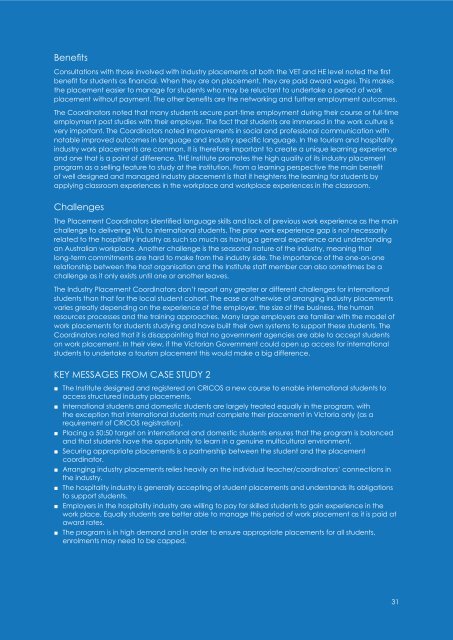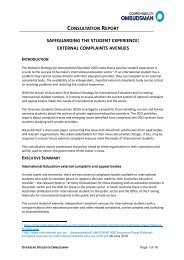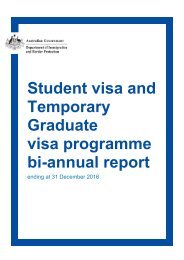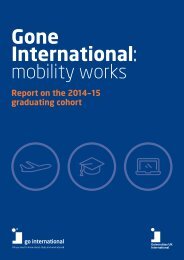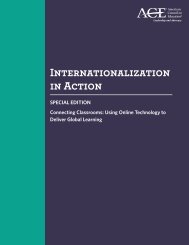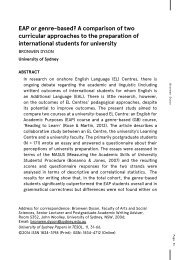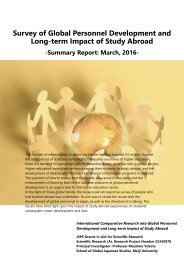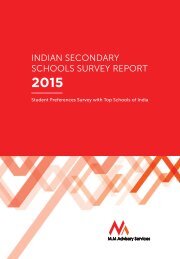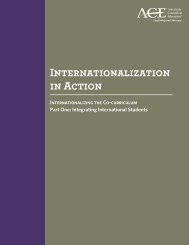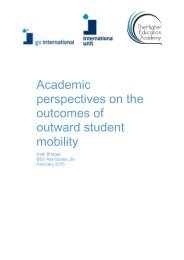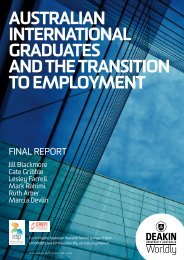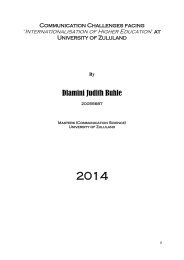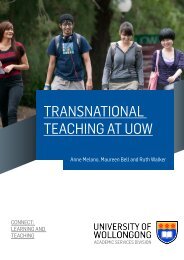internships-and-work-placement-opportunities-for-international-students-in-victoria-ieaa-report-october-2012
internships-and-work-placement-opportunities-for-international-students-in-victoria-ieaa-report-october-2012
internships-and-work-placement-opportunities-for-international-students-in-victoria-ieaa-report-october-2012
Create successful ePaper yourself
Turn your PDF publications into a flip-book with our unique Google optimized e-Paper software.
Benefits<br />
Consultations with those <strong>in</strong>volved with <strong>in</strong>dustry <strong>placement</strong>s at both the VET <strong>and</strong> HE level noted the first<br />
benefit <strong>for</strong> <strong>students</strong> as f<strong>in</strong>ancial. When they are on <strong>placement</strong>, they are paid award wages. This makes<br />
the <strong>placement</strong> easier to manage <strong>for</strong> <strong>students</strong> who may be reluctant to undertake a period of <strong>work</strong><br />
<strong>placement</strong> without payment. The other benefits are the net<strong>work</strong><strong>in</strong>g <strong>and</strong> further employment outcomes.<br />
The Coord<strong>in</strong>ators noted that many <strong>students</strong> secure part-time employment dur<strong>in</strong>g their course or full-time<br />
employment post studies with their employer. The fact that <strong>students</strong> are immersed <strong>in</strong> the <strong>work</strong> culture is<br />
very important. The Coord<strong>in</strong>ators noted improvements <strong>in</strong> social <strong>and</strong> professional communication with<br />
notable improved outcomes <strong>in</strong> language <strong>and</strong> <strong>in</strong>dustry specific language. In the tourism <strong>and</strong> hospitality<br />
<strong>in</strong>dustry <strong>work</strong> <strong>placement</strong>s are common. It is there<strong>for</strong>e important to create a unique learn<strong>in</strong>g experience<br />
<strong>and</strong> one that is a po<strong>in</strong>t of difference. THE Institute promotes the high quality of its <strong>in</strong>dustry <strong>placement</strong><br />
program as a sell<strong>in</strong>g feature to study at the <strong>in</strong>stitution. From a learn<strong>in</strong>g perspective the ma<strong>in</strong> benefit<br />
of well designed <strong>and</strong> managed <strong>in</strong>dustry <strong>placement</strong> is that it heightens the learn<strong>in</strong>g <strong>for</strong> <strong>students</strong> by<br />
apply<strong>in</strong>g classroom experiences <strong>in</strong> the <strong>work</strong>place <strong>and</strong> <strong>work</strong>place experiences <strong>in</strong> the classroom.<br />
Challenges<br />
The Placement Coord<strong>in</strong>ators identified language skills <strong>and</strong> lack of previous <strong>work</strong> experience as the ma<strong>in</strong><br />
challenge to deliver<strong>in</strong>g WIL to <strong><strong>in</strong>ternational</strong> <strong>students</strong>. The prior <strong>work</strong> experience gap is not necessarily<br />
related to the hospitality <strong>in</strong>dustry as such so much as hav<strong>in</strong>g a general experience <strong>and</strong> underst<strong>and</strong><strong>in</strong>g<br />
an Australian <strong>work</strong>place. Another challenge is the seasonal nature of the <strong>in</strong>dustry, mean<strong>in</strong>g that<br />
long-term commitments are hard to make from the <strong>in</strong>dustry side. The importance of the one-on-one<br />
relationship between the host organisation <strong>and</strong> the Institute staff member can also sometimes be a<br />
challenge as it only exists until one or another leaves.<br />
The Industry Placement Coord<strong>in</strong>ators don’t <strong>report</strong> any greater or different challenges <strong>for</strong> <strong><strong>in</strong>ternational</strong><br />
<strong>students</strong> than that <strong>for</strong> the local student cohort. The ease or otherwise of arrang<strong>in</strong>g <strong>in</strong>dustry <strong>placement</strong>s<br />
varies greatly depend<strong>in</strong>g on the experience of the employer, the size of the bus<strong>in</strong>ess, the human<br />
resources processes <strong>and</strong> the tra<strong>in</strong><strong>in</strong>g approaches. Many large employers are familiar with the model of<br />
<strong>work</strong> <strong>placement</strong>s <strong>for</strong> <strong>students</strong> study<strong>in</strong>g <strong>and</strong> have built their own systems to support these <strong>students</strong>. The<br />
Coord<strong>in</strong>ators noted that it is disappo<strong>in</strong>t<strong>in</strong>g that no government agencies are able to accept <strong>students</strong><br />
on <strong>work</strong> <strong>placement</strong>. In their view, if the Victorian Government could open up access <strong>for</strong> <strong><strong>in</strong>ternational</strong><br />
<strong>students</strong> to undertake a tourism <strong>placement</strong> this would make a big difference.<br />
KEY MESSAGES FROM CASE STUDY 2<br />
■■<br />
The Institute designed <strong>and</strong> registered on CRICOS a new course to enable <strong><strong>in</strong>ternational</strong> <strong>students</strong> to<br />
access structured <strong>in</strong>dustry <strong>placement</strong>s.<br />
■■<br />
International <strong>students</strong> <strong>and</strong> domestic <strong>students</strong> are largely treated equally <strong>in</strong> the program, with<br />
the exception that <strong><strong>in</strong>ternational</strong> <strong>students</strong> must complete their <strong>placement</strong> <strong>in</strong> Victoria only (as a<br />
requirement of CRICOS registration).<br />
■■<br />
Plac<strong>in</strong>g a 50:50 target on <strong><strong>in</strong>ternational</strong> <strong>and</strong> domestic <strong>students</strong> ensures that the program is balanced<br />
<strong>and</strong> that <strong>students</strong> have the opportunity to learn <strong>in</strong> a genu<strong>in</strong>e multicultural environment.<br />
■■<br />
Secur<strong>in</strong>g appropriate <strong>placement</strong>s is a partnership between the student <strong>and</strong> the <strong>placement</strong><br />
coord<strong>in</strong>ator.<br />
■■<br />
Arrang<strong>in</strong>g <strong>in</strong>dustry <strong>placement</strong>s relies heavily on the <strong>in</strong>dividual teacher/coord<strong>in</strong>ators’ connections <strong>in</strong><br />
the <strong>in</strong>dustry.<br />
■■<br />
The hospitality <strong>in</strong>dustry is generally accept<strong>in</strong>g of student <strong>placement</strong>s <strong>and</strong> underst<strong>and</strong>s its obligations<br />
to support <strong>students</strong>.<br />
■■<br />
Employers <strong>in</strong> the hospitality <strong>in</strong>dustry are will<strong>in</strong>g to pay <strong>for</strong> skilled <strong>students</strong> to ga<strong>in</strong> experience <strong>in</strong> the<br />
<strong>work</strong> place. Equally <strong>students</strong> are better able to manage this period of <strong>work</strong> <strong>placement</strong> as it is paid at<br />
award rates.<br />
■■<br />
The program is <strong>in</strong> high dem<strong>and</strong> <strong>and</strong> <strong>in</strong> order to ensure appropriate <strong>placement</strong>s <strong>for</strong> all <strong>students</strong>,<br />
enrolments may need to be capped.<br />
31


